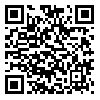BibTeX | RIS | EndNote | Medlars | ProCite | Reference Manager | RefWorks
Send citation to:
URL: http://ijpcp.iums.ac.ir/article-1-1452-en.html
2- Behavioral Sciences Research Center, Shahid Beheshti University of Medical Sciences.
Objectives: The purpose of the current study was to assess the effectiveness of multi-dimensional group therapy for symptoms of obsessive-compulsive disorder (OCD). Method: Among 53 patients with OCD referred to a hospital in Tehran, 12 patients to experimental group and 12 patients to control group were assigned. Not being affected to major depression, bipolar disorder and personality disorder was approved. The data was gathered using clinical interview based on Diagnostic and Statistical Manual of Mental Disorders, 4th edition, Text Revision (DSM-IV-TR), Cattel Personality Test and Yale-Brown Obsessive-Compulsive Scale (Y-BOCS). For evaluating the symptoms severity, Y-BOCS were executed before, during and after intervention. Multi-dimensional group therapy was performed in thirty 2-hour sessions based on Clark Therapeutic Program in accordance with Lazarus multi-dimensional treatment and Islamic-Iranian culture. Results: The severity of symptoms subscale decreased during treatment (p<0.001). Conclusion: Designed multi-dimensional group therapy based on Islamic culture was effective for treatment of OCD symptoms.
Received: 2012/05/2 | Published: 2012/01/15
| Rights and permissions | |
 |
This work is licensed under a Creative Commons Attribution-NonCommercial 4.0 International License. |



